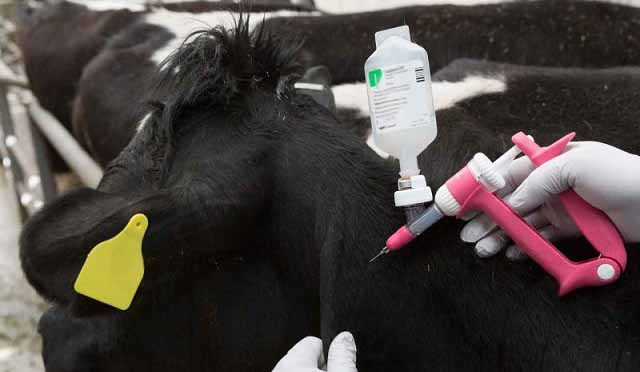News
Gov’t outlines plan to control FMD

A cow being vaccinated against FMD
The Government of Uganda through the Ministry of Agriculture Animal Industry and Fisheries is set to Use 13bilion shillings to procure 3 million doses of Foot and Mouth disease (FMD) Vaccines directly from manufacturers for animal Vaccination against FMD.
The state minister for Agriculture Animal and Husbandry, Bright Rwamirama said that his ministry has already procured two million four hundred thousand (2,400,000) doses of FMD vaccine and is planning to administer the vaccine strategically in affected areas, high risk areas and transit routes.
The FMD vaccine is procured by MAAIF and provided to the farmers through the District Veterinary Officers (DVO) free of charge.
Foot and mouth disease (FMD) is a viral disease that affects cattle, goats, sheep and pigs among the domestic animals. It also affects the related cloven (two) hooved wild animals like the buffaloes, antelopes and wild Pigs.
The virus has seven serotypes, each of which presents as a different disease with similar clinical signs.
The seven serotypes are “O”, “A”, “C”, SAT 1, SAT 2/ SAT 3 and Asia 1, In Uganda six of the seven serotype have occurred, except Asia 1.
Currently the common serotypes occurring are “O”, “A”, SAT 1 and SAT 2, the vaccine used in Uganda therefore contains these serotypes.
According to the Annual Agriculture Survey 2018, Uganda’s livestock population is estimated at 12.8 million head of cattle, 15.2 million head of goats; sheep is at 5.4 million and pigs 5 million. This translates to 37.7 million livestock that are susceptible to FMD.
Rwamirama says the 37.7 million livestock, is in addition to the wild life that is susceptible to FMD and the fact that there are four serotypes that are common in Uganda.
“FMD control is complex and therefore needs a lot of resources; human, structural, consumables and financial to control the disease” he said.
Rwamirama said this time the Foot and Mouth disease broke out in areas of Isingiro and Kiruhura but in Isingiro it was contained. He identified some key risk areas which are situated next to the game parks and boarder points and transit routes.
The high Risk areas identified are 24 districts and FMD vaccination is being undertaken are, Gomba District, Isingiro, Kalungu, Kampala, Kazo, Kiryandongo, Kyankwanzi, Kyotera, Koboko, Lyantonde, Mbarara, Masindi, Mukono, Nakaseke, Nakasongola, Rakai, Rubirizi, Sembabule, Ibanda and Serere, Vaccination is also being undertaken at the government NEC Farm.
Rwamirama, said the ministry will employ strategic ‘ring’ Vaccination to control FMD, “the ring Vaccination strategy entails vaccinating herds surrounding the focal herd where the infection has occurred and ending up vaccinating the focal herds, these must be vaccinated with exception of clinically sick animals to avoid spread with in the herds.”
He said the District Veterinary Officers (DVOs) will collect the FMD Vaccine from MAAIF, and transport it to the district and to the farms to ensure that the cold chain is maintained.
“Vaccinations shall only be undertaken by government personnel’s, and accountability will be provided by MAAIF, including the telephone contact of the farmer, and a form to capture this data has already been provided to the veterinary officers,” He said.
Rwamirama said the Chief Administrative Officers, will provide necessary facilitation and allowances required for vaccination.
He said there will be quarantine in districts which have reported the FMD and no Milk and animal product will be allowed to come from the affected areas.
“There’s going to be check points at Sub County levels, with disinfection established along the major routes entering or exiting the affected Subcounty, the Checkpoints shall be manned by the local Council personnel the police, the parish chiefs and other law enforcement personnel supervised and coordinated by the area veterinary officer,” he noted.
Rwamirama urged Veterinary officers at district levels to have proper mechanism of early disease detection and reporting to commissioner Animal health, ensuring timely and routine vaccination using vaccines provided by MAAIF and also ensure strict animal movement.
He encouraged farmers to implement effective on farm bio security measures such as having the affected animals isolated from the rest herd, properly fencing the farm stopping the mixture of animals with those from other farms, prohibiting free movement of visitors on farms and ensuring that the affected animals are properly treated by a competent Veterinary officer using an appropriate drug to avoid secondary bacterial infections.
He added “Animal products must be appropriately packaged to avoid spillage, Animals and animal products shall not go into, through or out of affected areas.
Rwamirama called for a strong human resource capacity in the district for effective disease control (including staff facilitation for vaccination activities), an effective FMD disease communication strategy so that awareness about FMD is created amongst all stakeholders in the district and outside and a district should have proper framework for disease monitoring and evaluation.
Comments






















